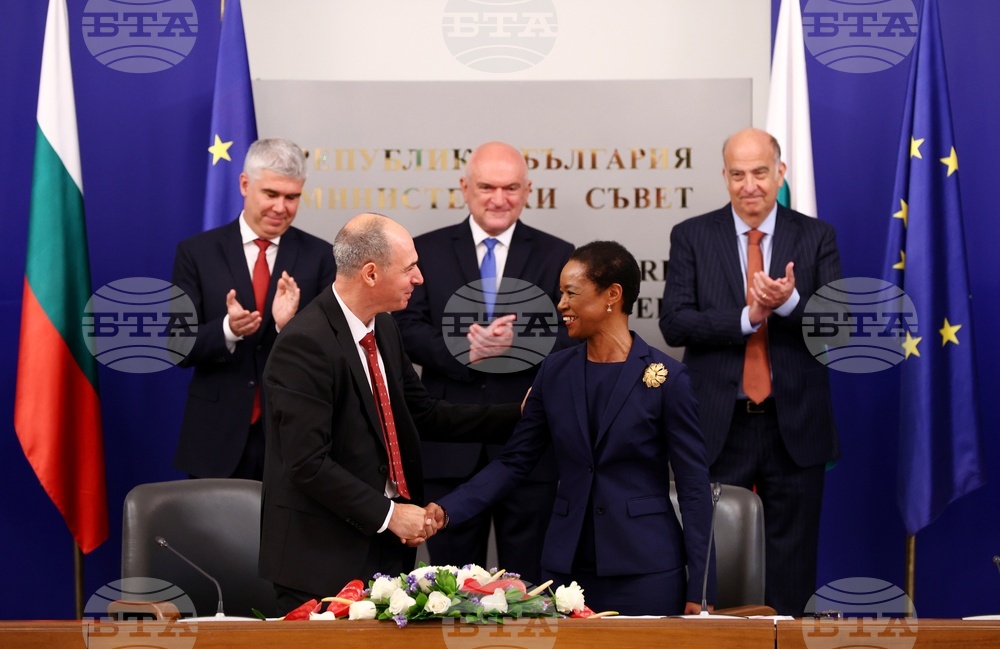site.btaUPDATED ESO, USTDA Sign Agreement on USD 1.5 Mln Grant for East-West Energy Corridor Study


The United States Trade and Development Agency (USTDA) signed an agreement with Bulgaria's Electricity System Operator (ESO) in Sofia on Monday for a USD 1.5 million grant to finance a feasibility study for building an East-West Energy Corridor. The deal was signed in the presence of Prime Minister Dimitar Glavchev, Energy Minister Vladimir Malinov and US Ambassador to Bulgaria Kenneth Merten.
The ESO-initiated project is aimed to connect the electricity transmission systems of Turkiye, Bulgaria, Greece, North Macedonia, Kosovo, Albania and Montenegro, with an option to bring Italy into the scheme as well.
The expansion of cross-border electricity transmission capacities and the possibility of real-time exchange of energy produced from renewable sources in the region are pivotal for effectively utilizing green energy and achieving the goals of decarbonization and green transformation, the government said.
ESO Executive Director Angelin Tsachev and USTDA Director Enoh T. Ebong affixed their signatures to the agreement at the Council of Ministers offices in Sofia.
If the study confirms the feasibility of the project, the undertaking can increase Bulgaria's transborder electricity transmission capacity by more than 2,000 MW.
After the signing ceremony, Energy Minister Malinov told BTA that the building of pumped-storage hydroelectric power stations on the Dospat and Batak dams may take four to five years, provided that the projects are structured properly and the necessary efforts are made.
Malinov said: "We are working with the World Bank and the European Investment Bank as well as USTDA for the implementation of new electricity storage projects. These include the development of the Dospat and Batak dams and the restart of the Chaira Pumped Storage Hydropower Plant."
He was adamant that electricity storage is essential to make consumers feel the benefits of low-cost green energy from solar and wind power.
"With the increasing penetration of renewable energy in the energy mix of Southeast European countries, it is very important to have a rapid development of the electricity infrastructure to enable the green energy produced in the countries of the region to be shared and used efficiently," Angelin Tsachev said at the event. "Meetings with the system operators of Turkiye, the Republic of North Macedonia, Albania, Montenegro, Kosovo, Serbia and Romania confirmed our understanding that there is a need to build such a corridor," he added.
The East-West corridor starts in Turkiye, passes through Bulgaria and on, via North Macedonia, Albania, Kosovo, Montenegro, to Italy.
The feasibility study, to be carried out by the consultancy Black and Veatch, should show the viability and necessity of building four new transmission lines to increase the transmission capacity to Romania, Greece, Turkiye and the Republic of North Macedonia. As a result, more RES will be allowed to connect to the grid, Enoh T. Ebong pointed out. According to the head of USTDA, Bulgaria's energy transition means building the necessary infrastructure and strengthening regional energy cooperation through expanded green energy transmission capacity.
USTDA is also willing to support the renovation of the Sofia thermo-electric power plant and is already in contact with the City Hall, added Enoh T. Ebong.
So far, the Agency has financed more than 50 renovation activities in the energy, transport and telecommunications sectors in Bulgaria.
US Ambassador Kenneth Merten said that this is going to be a very big project, involving an upgrade of Bulgaria's electricity transmission system. The goal is to have more and more renewable energy, a more modern and secure power grid, he added. The feasibility study will also lay the groundwork to open up more opportunities to export energy to Turkiye, the Republic of North Macedonia, Greece, Kosovo, Montenegro and possibly Italy.
Energy Minister Vladimir Malinov described the signing of the agreement as “another stage in the fruitful cooperation and development of relations between Bulgaria and the US”.
"In the face of the US Trade and Development Agency we have a reliable partner whose expertise and professionalism are undeniable assets for the development of our relations, projects and for the development of the Bulgarian energy sector," Minister Malinov said. "Once this project is implemented, we will achieve an increase in energy security not only for Bulgaria but for the whole region. It is also another key step in the process of transformation of the Bulgarian energy sector. It will enable the real-time exchange of electricity between the countries in the region, allowing the stabilization of the electricity markets. Last but not least, it will enable the transmission of green energy from large production facilities and secure electricity consumption throughout the region," he added.
For example, large generation capacities could secure projects in the Caspian region and in North Africa, the caretaker energy minister also said.
/DD/
news.modal.header
news.modal.text